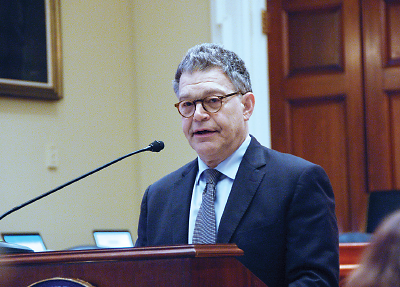Bipartisan Group of Legislators Introduce Justice and Mental Health Bill
Abstract
The bill aims to enhance efforts to identify and treat people with mental illness at each point in the criminal justice system, including investments in treatment courts for veterans and training programs for law enforcement officers.
Two lawmakers introduced bipartisan legislation in April to “improve the ability of government, communities, and law enforcement to properly identify and address the unique needs of mentally ill offenders.”
“The Comprehensive Justice and Mental Health Act of 2015” would reauthorize and expand the Mentally Ill Offender Treatment and Crime Reduction Act (MIOTCRA), which passed in 2004. The bill is intended to reduce imprisonment of people with mental illness and identify and provide treatment to them in the nation’s criminal justice system. It also includes provisions for planning the release of prisoners to ease their transition to care after release.

Sen. Al Franken (D-Minn.) says that the criminal justice system should not be a replacement for a functional mental health system.
The legislation was introduced by Sen. Al Franken (D-Minn.) and Rep. Doug Collins (R-Ga.) with a bipartisan list of cosponsors. Similar legislation put forward by Franken in 2013 was approved by the Senate Judiciary Committee.
The bill reflects a growing realization of the human and economic costs of managing people with mental illness when they interact with the criminal justice system.
“U.S. jails have effectively replaced inpatient mental health facilities as the largest institutional treatment providers for adults with mental illnesses,” said Collins when introducing the bill in April. “Each year, more than two million people with serious mental illnesses are booked into jails, as well as millions more coping with less serious mental illnesses that jails are nonetheless required to address.”
“Right now, our criminal justice system is facing a crisis,” agreed Franken. “We’re using jails and prisons as a substitute for a properly functioning mental health system. This is a problem—it’s causing overcrowding in our correctional facilities and forcing taxpayers to foot the bill.”
The present system also does little for people with mental illness, he added.
One grant program new in this session’s bill is based on the “sequential intercept” model, a series of targeted strategies that emphasize interventions for dealing with people with mental illness at various stages of the criminal justice process. The model includes supporting emergency and crisis services; training in specialized responses by police; court hearings and disposition alternatives; reentry from jails and prisons; and community supervision, treatment, and support services.
Another new provision calls for amending the Omnibus Crime Control and Safe Streets Act of 1968 to support veterans’ treatment courts, peer-to-peer services for veterans, and related assistance. Additionally, the bill covers training for police and emergency department personnel and for community-crisis response teams to develop plans to deal with what the sponsors called “frequent users of crisis services.”
“MIOTCRA has had wide support in the mental health community,” said Matthew Sturm, director of legislative and regulatory policy for APA’s Department of Government Relations. This support includes that of the American Psychiatric Association Foundation, which is working closely with the Council of State Governments and the National Association of Counties to urge the bill’s passage.
Because the legislation concerns the Department of Justice, it will be routed through judiciary committees rather than committees concerned with health. The sponsors are expected to push for early committee consideration, said Sturm. ■
Information on the Comprehensive Justice and Mental Health Act can be accessed here.



